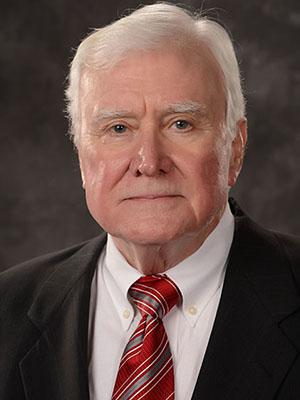
I would like to take a few minutes to talk about this remarkable man. Bill McCain was a gentleman and a soldier and a scholar. This tireless individual worked for 68 years and was in the classroom just a week or so before he died. Let me share with you his history.
In 1951, Bill enlisted in the U.S. Army. He served in the Korean War and was discharged at the rank of sergeant in 1953. Only three years later, he received a bachelor’s degree in chemical engineering from Mississippi State College.
Upon graduation, he went to work for Esso Research Laboratories in Baton Rouge, where he worked from 1956-1963. This is where he must have begun learning about what became his lifelong specialty: the properties of petroleum fluids. During this period, he managed to receive a Master of Science degree from the Georgia Institute of Technology and a Ph.D. from Georgia Tech, again in chemical engineering.
In 1963, Bill returned to Mississippi State to serve on the petroleum engineering faculty, and after a couple of years, became the department head, a position he held for 11 years. Throughout his time at Mississippi State, he also served in the Mississippi National Guard, eventually rising to the position of commander.
In 1976, the Army called again and Bill resumed his full-time military career, this time as an officer. He served in a variety of leadership roles, mainly at the Pentagon, and retired from the Army in 1984 with the rank of brigadier general.
After his last Army stint, Bill resumed his academic career, joining our petroleum engineering department as a visiting professor. He took two breaks from teaching to be a full-time consultant, but always returned to Texas A&M University as a visiting professor. He visited us for 27 years, which must be some kind of record.
Between Mississippi State and Texas A&M, Bill’s academic career spanned 46 years. For eight or nine of those A&M years, he had another full-time job as executive vice president and chief engineer at S.A. Holditch & Associates.
I find this career of Bill’s remarkable, but what I personally admired the most was his scholarship.
When you listened to what Bill said, you quickly realized this was a man of extraordinary intellect. He was a brilliant thermodynamicist, and in my opinion, knew more about the physical behavior of petroleum fluids than anyone else in the world. “The Properties of Petroleum Fluids,” the book that he wrote, and re-wrote and re-wrote, will be his legacy. It has sold tens of thousands of copies, and will be on the bookshelves of petroleum engineers for many years to come.
The second trait I most admired was his skill as a teacher.
Bill was absolutely passionate about his subject and wanted all his students to learn what he knew. His enthusiasm and dedication were unmatched on our faculty. Students flocked to his courses because of how valuable what they learned could be in their careers. Bill was also in high demand to conduct industry short courses. I doubt anyone in petroleum engineering education, other than perhaps John Lee, has trained as many industry practitioners.
He presented a graduate seminar in our department a number of years ago. The subject was global warming and the relationship with the CO2 concentration in the atmosphere. This is a multicomponent gas-phase equilibrium problem – right in the middle of Bill’s specialty. I don’t want to share Bill’s conclusions here, but I recall that he attacked the problem using fundamental principles of thermodynamics, that he clearly explained his approach and the results, and that it was completely original. It is to this day one of the best lectures I have ever heard.
I close with one last observation about Bill McCain – what a tough old bird, what a fighter! He was diagnosed with cancer in 2012 and fought it tooth and nail ever since. None of us win this fight against death, but in Bill’s case I would say it was pretty close to a draw.
We are all sad that he is gone and will miss him, but we are also happy he is no longer suffering.